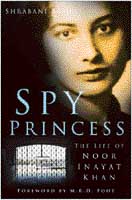|
Noor Inayat Khan, a fluent French speaker, was sent in June 1943 by the British SOE (Special Operations Executive) into occupied France as an underground radio operator, the first woman to do so, to aid the French Resistance. Within the space of ten days her network was decimated, largely due to betrayal by double agents. Soon she was the only radio operator left in the whole of Paris and in great danger. But she refused the opportunity to return to London, saying that she was determined to keep open the radio link for the Resistance and rebuild the group. For three months she evaded capture, constantly on the move, contacting London daily from different locations in Paris, achieving important successes in her work. |
 |
|
|
Eventually, only days short of being replaced, she was betrayed and captured by the Gestapo. Held in the Gestapo headquarters in Paris, she made two daring attempts to escape. Refusing to give up these attempts, she was transferred to Germany. For ten months she was held in Pforzheim Prison in solitary confinement, shackled hand and foot, half-starved, repeatedly tortured. She gave no information at all. On the night of 13 September 1944, having been moved to Dachau concentration camp, she was abused and kicked near to death hour after hour by her SS captors, then in the early hours shot through the head. She uttered one word only during that long brutal night. As the fatal shot rang out, she cried the one word: “liberte!” She was thirty years old. In France she is remembered by her codename Madeleine dans la Resistance and was honoured with the Croix de Geurre. In Britain she was awarded the highest civilian honour, the George Cross.
The Spy Princess, Shrabani Basu’s story of Noor Inayat Khan’s life and heroic sacrifice has been painstakingly researched, making extensive use of recently released SOE files and the reminiscences of family and friends, and is told with great compassion and deep respect. It is a story of supreme courage worth reading again and again and repeating.
Noor Inayat Khan was the daughter of an American mother and an Indian father, Inayat Khan, a leading teacher and musician of the progressive Sufi philosophy. Noor grew up and was educated in Paris, where her father had set up a Sufi centre, and had become an accomplished musician and writer and broadcaster of children’s stories by her mid twenties, having studied music with the famous Nadia Boulanger and child psychology at the Sorbonne. From an early age, though always quiet and thoughtful, she had shown a fierce independence of spirit and determination to make up her own mind.
With the outbreak of war and the German advance on Paris, Noor and her brother Vilayat decided they must move to England and take an active stand against fascism in whatever way they could. Noor was an Indian patriot. She was the great-great-great-granddaughter of Tipu Sultan, the legendary Tiger of Mysore, scourge of British rule. He helped his father Haider Ali defeat the British in the Second Mysore War. Tipu Sultan died defending his capital Srirangapatnam on May 4, 1799. Her father had told her many times of his great courage in the fight for Indian freedom against colonial oppression. Having joined first the Red Cross and then the WAAF (Women’s Auxiliary Air Force) on reaching Britain, she was later to surprise her interviewers when applying for a commission by speaking thus: She told the board that as long as the war with Germany was on, she would be loyal to the British government and the Crown. But after the war she may reconsider her position and might find that she had to support India against Britain in the fight for independence. Born and brought up in Europe, a lover of the great heritage of European culture as well as that of India, like her father an advocate of the unity of the peoples of East and West, face to face with Nazi tyranny Noor had no doubt where her internationalist duty lay. Having become a radio operator in the WAAF, on account of her fluent French and her personal qualities Noor was asked to train as a secret agent for work in occupied France, a task she had no hesitation in accepting and which was to lead, as she knew well it might, to the ultimate sacrifice.
Today, when self-aggrandizing leaders in the service of the great corporations once again threaten to drag humanity into catastrophic world war – when bestiality akin to that of the Nazis once again shows its face in the Abu Graibs and Guantanamo Bays, the Hadithas and Fallujas of the world – the unbreakable courage and selfless sacrifice of Noor Inayat Khan serves as a reminder and inspiration that the plans of the Hitlers of today too will inevitably meet an inglorious fate and that the cherished liberte of all peoples, fought for so heroically by Noor as by her illustrious forebear, their shared goals on the high road of culture and civilization, will surely be won.
Chris Coleman The Spy Princess by Shrabani Basu is published by Sutton Publishing and is available price £18.99 from bookshops. |
|
